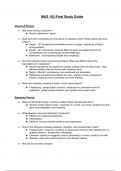MUS 103 Final Study Guide
Classical Period:
● Who were the key composers?
★ Mozart, Beethoven, Haydn
● What were their contributions to the history of Classical music? What makes their work
unique?
★ Haydn - 107 symphonies (incredible amount of output, inspired by JS Bach,
string quartets)
★ Mozart - 60+ symphonies (learned different styles and applied that to his
compositions, lots of expressing emotions/feelings)
★ Beethoven - 9 symphonies (length and complexity)
● How did Classical music change around them? What was different about the
expectations for composers?
★ Haydn had patrons and worked for royalty, making music for their courts. They
followed certain rules and forms while creating music.
★ Music in Mozart’s era became more emotional and expressive
★ Beethoven pushed the boundaries of music, making it more personal and
intense. During his time composers had more freedom.
● What new methods of making a living in music were present?
★ Freelancing - played public concerts, composed for commission and for
publication, taught private students, and royalties from sheet music
Romantic Period:
● What are Romantic Songs or German Lieder? What characterizes them?
★ German Lieder (piano+voice) - character or a mood, very short, simple forms that
were very predictable, word painting
● What shaped or drove the Romantic Composer?
★ Passions for personal expression
★ Individualism
★ Desire to convey powerful emotions and experiences
● What is the difference between absolute, character, and programmatic music?
★ Programmatic: recounts a narrative of sequences of events often spelled out in a
program (Berlioz - Symphonie Fantastique)
★ Character: depicts or suggests a mood, personality, or scene, usually in the title
★ Absolute: plays with sound and form in an abstract manner
● How did the orchestra change?
, ★ Orchestras expanded in number of players
★ More instrumentation included, such as flutes, oboes, clarinets, bassoons,
saxophone, trumpet,
★ Conductors are interpreters of the music
● When and how did the term “Classical” become a substitute for a whole history of
European music?
★ “Classical” is a label for a certain period in music history that happened around
the 19th century
● What is nationalism? What is its role in music?
★ Nationalism: Celebrating and supporting your country’s culture, history, traditions,
and values
★ Compositions that reflect a country’s cultural elements, folklore, history, or
themes associated with national identity. Melodies, rhythms, or musical styles
that are unique to the country or region.
★ Italy
- Emphasized virtuosity and expression
- Known as inventor and perfectors for most styles
- Venice remained the center of Opera
- Verdi and Rossini
★ France
- Music used as propaganda
- Known for elegance and restraint
- Lully
★ England
- London is the fastest growing city in Europe and the biggest music market
- Handel
★ Germany
- abstract instrumental music
- Wagner
20th Century:
● What is avant-garde? What kind of music is avant-garde? Give examples.
★ The innovative, experimental, and unconventional approaches to composition
and musical expression. It challenges traditional musical conventions, structures,
and styles, often pushing the boundaries of what is considered normal or
acceptable in music
★ Avant-Garde music:
- Classical and contemporary (Schonberg - Pierrot Lunaire)
- Electronic and experimental (Stockhausen - Kontakte)
- Jazz/Free Jazz (Coleman - Double Quartet - “Free Jazz”)
● What were the earliest genres of American music?
★ African American spirituals
★ Folk music




